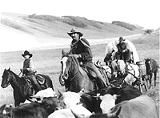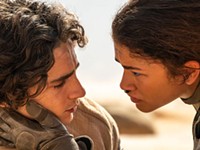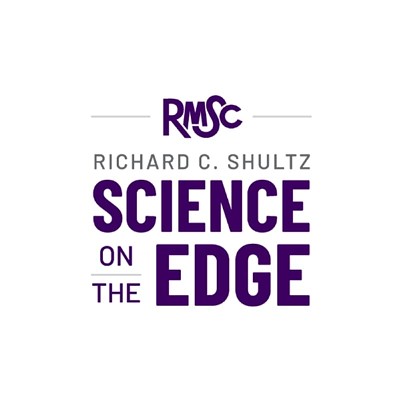[
{
"name": "500x250 Ad",
"insertPoint": "5",
"component": "15667920",
"parentWrapperClass": "",
"requiredCountToDisplay": "1"
}
]
The release of Kevin Costner's generally impressive new picture, Open Range, ironically emphasizes the delicate condition of that once robust genre, the Western. Innumerable students of the form at every level of learning offer a wide variety of reasons for its virtual disappearance over the last three decades --- the war in Vietnam, a new understanding of the history of conquest and colonialism, increased sensitivity to the racism in the treatment of Native Americans, and of course, the imperial presidency of Ronald Reagan, which placed a cowboy in the White House, a sort of Western that played in theaters near all of us.
Whatever its occasionally troubling subjects and themes, however, it remains a vital and significant expression of certain truths and values and serves some important and wholly relevant functions for cinema, society, and the culture in general.
In a time of heightened awareness of the environment, with a federal administration dedicated to the devastation of our green space and ancient trees, as well as the pollution of pure waters and clean air, the Western should remind us of a mostly vanished past, the natural beauty of a challenging, unspoiled landscape --- the rolling prairies, the harsh deserts, the high plains, the majestic mountains of that vast region west of the Mississippi.
One of its obligatory scenes suggests the place of humans in that particular nature, a long shot of a lone rider traversing an expanse of land, which contrasts that puny, isolated figure with a savage and magnificent immensity. The familiar Western town, often a scattering of flimsy structures on a dusty street perched precariously on the edge of a vast wilderness, similarly demonstrates a timid and tentative gesture at civilization against the overwhelming presence of nature.
Like the flag, the genre has been appropriated by those who misinterpret its actions and meanings for their own ends. Ronald Reagan's senile posture of independence and toughness --- while his wife's astrologer made major policy decisions --- derived in part from his own acting experience in a number of Westerns.
At present, George W. Bush, scion of generations of WASP aristocracy, former cheerleader at Phillips Andover, graduate of Yale and Harvard, wears cowboy boots to enhance his diminutive stature and pretends to do chores on his ranch in Cow Flop, Texas, to entertain a fawning press corps.
Although the Western allegedly (and superficially) appeals to the politically conservative, in fact its values may inspire the liberal. Its frequent themes of class warfare --- the homesteader versus the cattle baron, most obviously, in films as different as Shane and Heaven's Gate --- generally conclude with victory for the progressive rather than the retrogressive. The small farmer ultimately defeats the great landowner, that recalcitrant representative of the past.
Even the marshal, who tames the dangerous town and defeats the outlaws, a killer himself, defends the law-abiding citizens. Although he is himself a man of action, he guarantees the newcomers a peaceful setting in which to build their church and school, those settled symbols of the tentative and ambiguous civilization in that wild place.
The cowboy himself, that most American of heroes, suggests political possibilities beyond his ostensible embodiment of our loudly proclaimed ideals of freedom and independence. Descending from actual frontiersmen like Daniel Boone and Natty Bumppo, his fictional counterpart in James Fenimore Cooper's Leatherstocking Tales, he owes a great deal to the gloss of mythology, but also represents a considerable departure from certain traditions of an ancient past.
In Europe, a man on a horse was necessarily a knight or an aristocrat. (Sports like fox hunting, show jumping, and polo demonstrate the social power of the horse, and chivalry and cavalry are after all the same word.) The American horseman, however, is a working man who rides his horse to make his living, violating centuries of hoary tradition.
The presence of women in those little dusty towns also hints at the paradoxically progressive nature of the form. Although the saloon and the brothel figure prominently, in accordance with historical fact, the "good" women provide the value structure that triumphs over lawlessness and anarchy, the reason for that church and school the villagers constantly discuss. Despite its attention to masculinity, then, in its antique way, the Western probably offers a more balanced sexual equality than scores of other sorts of action films and thus attains a certain moral relevance that the average blockbuster entirely ignores.
Aside from its rich possibilities for contemporary culture, the Western historically fulfills some special cinematic needs, supplying a necessary vehicle for actors that Hollywood, to its peril, now neglects. For several generations of cinema, virtually every major male actor appeared in Westerns. Some, like John Wayne and Randolph Scott, became almost entirely identified with the genre. Almost all the others --- Erroll Flynn, William Holden, Henry Fonda, Jimmy Stewart, Gregory Peck, Charlton Heston, Rock Hudson, Paul Newman, Robert Redford, Gene Hackman, James Caan, and almost anybody else you can think of --- appeared in significant numbers of Westerns.
Even actors ordinarily associated with urban settings and genres have strapped on six-guns and saddled up --- Humphrey Bogart and Jimmy Cagney in The Oklahoma Kid, for example, or Marlon Brando in One-Eyed Jacks and The Missouri Breaks, or even Dustin Hoffman in Little Big Man.
One of the most important reasons for an actor to appear in a Western involves the manhood ritual that the form usually presents, by which a character attains maturity and power, sadly, through killing. That manhood ritual also involves the actor himself. By impersonating a character in the Wild West, he proves his own masculinity to a public that demands virility above all else in its leading men.
After achieving critical acclaim on Broadway, the brooding, sensitive Montgomery Clift made his screen debut in Red River, one of the great trail drive Westerns, opposite the Duke himself. When Jimmy Stewart believed he needed to acquire a "harder" image, he played a dark and ambiguous hero, decidedly not the boy next door, in four fine Anthony Mann Westerns.
The form also provides a kind of assimilation for many American ethnics: Jews like Hoffman, Jeff Chandler, Tony Curtis, Gene Wilder; Italians like Frank Sinatra and Dean Martin; African Americans like Woody Strode and Mario Van Peebles; even Brits like Richard Harris and Sean Connery.
With a fake cowboy in the White House, a cynical and illegitimate administration creating a constant state of war to maintain power over a sheep-like populace (and we know the cattleman's antagonism for the sheepherder), and a generation of youths who probably barely know the form, the nation may need real Westerns (and real cowboys) more than ever.
The celebration of nature, the regard for the land itself, the populist values, the virtues of action, comradeship, and decency, even the ambivalent attitude toward progress, in the form of domesticity, civilization, and machinery, all seem useful for contemplation in our time. None of the popular genres express so much of America so pertinently and so entertainingly. We can only hope that Open Range hints at a revival of the greatest American genre.
You can hear George and his movie reviews on WXXI-FM 91.5 Fridays at 7:20 a.m., rerun on Saturdays at 8:50 a.m.
Latest in Movie Reviews
More by George Grella
-
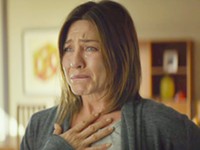
Film Review: "Cake"
Jan 26, 2015 -
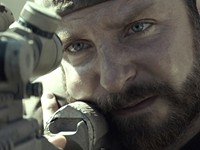
Film Review: "American Sniper"
Jan 19, 2015 -
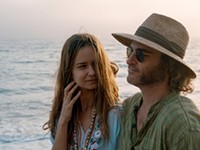
Film Review: "Inherent Vice"
Jan 12, 2015 - More »
